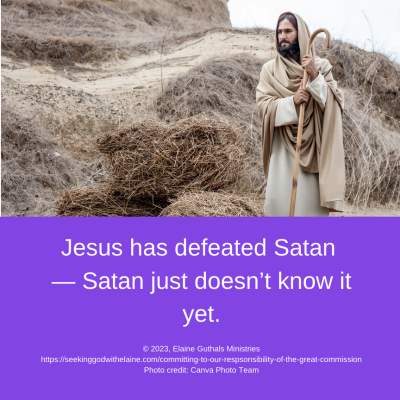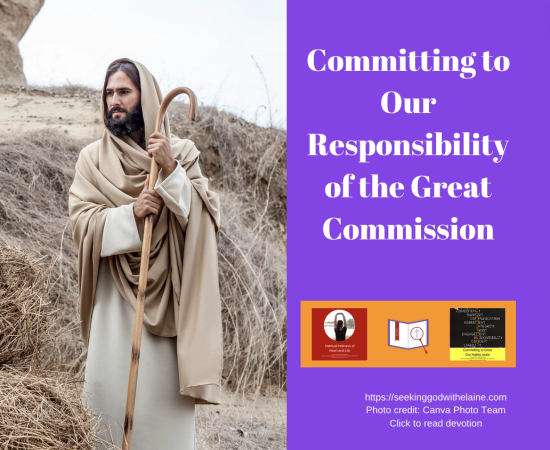Disciples are responsible for complying with the Great Commission. This devotional reading looks at what going means, how we are to make disciples, and the timeline for our mission.
Nuggets
- We are called to go elsewhere — wherever elsewhere may mean — to serve Christ.
- It is not only our responsibility to tell others the message of Christ, but it is also our responsibility to learn it through sanctification.
- Jesus doesn’t see our mission as being over anytime soon.

We are talking about how we are to be committed to our responsibility. Our marching orders are to preach the gospel and the Great Commission.
In the last devotion, we talked about how we are to preach to all creation. We used Langley’s divisions to organize our discussion on the responsibility to which we are to commit.
We are going to use the same divisions in it his devotion to discuss the Great Commission.
Let's Put It into Context
To read devotions in the Habitual Holiness of Heart and Life theme, click the button below.
Here is a running list of nuggets for the theme.
Devotions in the Commit to Grow Our Habits study
Here is a running list of nuggets for the study.
The headings are Langley’s words, organizing this devotion.
Resource
The Nature of the Command
“Go therefore and make disciples of all nations, baptizing them in the name of the Father and of the Son and of the Holy Spirit, teaching them to observe all that I have commanded you. And behold, I am with you always, to the end of the age” (Mt. 28: 19-20 ESV)
We are called to go elsewhere — wherever elsewhere may mean — to serve Christ.
Jesus set up a really interesting expectation. He tells us to go to others.
This is unusual. Southerns pointed that out. He wrote, “This distinguishes Christianity from all other systems of religion. It is not let them come if they will and receive the gospel, but go forth, leave all, and proclaim the gospel, etc.”
Resource
Jesus wasn’t content to just sit tight and let everyone come find Him. He takes the initiative — with us in tow.
The Great Commission can sometimes be seen as the call for us to be missionaries to other countries. I don’t see that as being the exclusive call.
The elsewhere does not have any mileage tied to it. We may elsewhere across the room to witness to someone. It may be across the building, across town, across the country, or across the globe.
Do you think that maybe the go has more to do with getting out of our comfort zones than it does with a geographic location?
The word which translates into go is really more about while you are going. Witnessing is supposed to be an integral part of our lives.
But we sometimes get the heebie-jeebies when we think about witnessing. No need.
We don’t serve a crucified Savior. We serve a risen Savior.
This Savior still has love for mankind. I love how Glover put it. He wrote, “Calvary has not robbed Him of His love.”
Resource
We are tasked with the purpose of showing that love to others.
Our message isn’t about us, it is about Jesus. We aren’t doing this on our own. We are being sent by the Rabbi.
We can’t let our commitment slide because we have doubts about ourselves. The One Who is sending us has the authority.
Think about where the Great Commission falls in the lineup of verses. Yes, it is the very end of the Book of Matthew.
This was right before Jesus’ ascension into Heaven. So, He has already lived, already died, and already risen.
This is the One sending us out.
How powerful is the God Who raised Jesus from the dead? Enough to overpower anything we have to face!
We have nothing to fear when Jesus sends us to go and preach. God is in control.
We have to be obedient. As Pastor Steve says, the blessings are in the obedience.
Cadman’s point about God using us tripped one of my thoughts. God doesn’t need us to expand His kingdom. He wants us.
As Cadman said, that makes us run right into Satan. He is the god of this world. He doesn’t want us to submit to God.
Resource
But Jesus has defeated Satan — Satan just doesn’t know it yet.

The Extent of This Command
“… make disciples of all nations, baptizing them in the name of the Father and of the Son and of the Holy Spirit, teaching them to observe all that I have commanded you …” (Mt. 28: 19-20 ESV)
It is not only our responsibility to tell others the message of Christ, but it is also our responsibility to learn it through sanctification.
We are given some specific tasks to focus our mission. We are to make disciples, baptize, and teach them. Let’s start at the end and work backwards this time.
Wait! What??? Teaching is at the end of the command??????
Don’t we generally think we have to teach someone before we make them into the way we want them? How can we make them disciples until we have taught that somewhat of what that means?
Dykes gave us an interesting snapshot into conversion. He wrote, “The two processes which made up conversion were discriminated as baptizing and teaching.”
Resource
- Conversion is the product of repentance, when we turn away from our sins and return to God, that secures salvation.
- Repentance is acknowledging our separation from God and expressing sorrow for breaking God’s laws and commandments by making the commitment to change our sinful ways to ways of righteousness through obedience.
- Sin is not believing that Jesus is our Savior to save us from our actions by humans that disobey God and break one of His reasonable, holy, and righteous laws and commandments, goes against a purpose He has for us, or follows Satan’s promptings.
- Holy means to be set apart — because of our devotion to God — to become perfect, and morally pure while possessing all virtues.
- Perfection means we reach a state of maturity because the combination of the spiritual graces form, when all are present, spiritual wholeness or completeness — holy, sanctified, and righteous.
- Spiritual graces are worldly morals that have been submitted to God to further His kingdom instead of enhancing this world.
- Sanctified means to be set free from sin.
- Righteous means we are free from sin because we are following God’s moral laws.
- Pure means not being sinful or having the stain of sin.
- Virtues are standards of moral excellence.
- Perfection means we reach a state of maturity because the combination of the spiritual graces form, when all are present, spiritual wholeness or completeness — holy, sanctified, and righteous.
- Holy means to be set apart — because of our devotion to God — to become perfect, and morally pure while possessing all virtues.
- Sin is not believing that Jesus is our Savior to save us from our actions by humans that disobey God and break one of His reasonable, holy, and righteous laws and commandments, goes against a purpose He has for us, or follows Satan’s promptings.
- Obedience means submitting ourselves to the will of God as it is presented to us and living our lives accordingly.
- Repentance is acknowledging our separation from God and expressing sorrow for breaking God’s laws and commandments by making the commitment to change our sinful ways to ways of righteousness through obedience.
- Salvation is the gift of life through the deliverance from condemnation and sin to acceptance and holiness and changes us from being spiritually dead to spiritually alive.
- Holiness is the transcendent excellence of His nature that includes elements of purity, dedication, and commitment that lead to being set apart.
- Purity means possessing God’s moral character, having eliminated the stain of sin.
- Spiritual death is the separation from God that occurred as a consequence of Adam and Eve’s original sin.
- The spiritually alive are those who have ABCDed, so they are no longer separated from God.
- Holiness is the transcendent excellence of His nature that includes elements of purity, dedication, and commitment that lead to being set apart.
The ABCDs of Salvation
If you have not become a believer in Christ, please read through the
Plan of Salvation and prayerfully consider what God is asking you to do.
A – admit our sins
B – believe His Son Jesus is our Redeemer
C – confess God as Sovereign Lord
D – demonstrate that commitment by making any changes needed in our lives to live the way in which God has called us
The Disciple’s Job Description
Glossary
We have to be taught Jesus’s message and what it means to us before we can be converted and be baptized. We have to know what we are accepting.
Dykes pointed out something important. He wrote, “… the apostles were to be the representation to other men in other lands of that same spiritual process which had passed upon themselves. Christ first brought His disciples to that point at which they were willing to accept Him by a public profession and a symbolic sacrament, and then built up their Christian life in knowledge and service.”
Resource
Just like Jesus was the example for His students, His students were to be the example for others. We, in turn, are to be the example for our others.
But the teaching doesn’t end at conversion. God continues to reveal Himself to us. We will be learning until God calls us home.
The Holy Spirit guides us to what it means in specific situations to be a child of God. That is what the Sanctification Road is all about.
Sanctification is the transformational process of the mind, body, and soul, which begins with regeneration; gradually changes our nature and morals through the promptings of the Holy Spirit; and ends with perfected state of spiritual wholeness or completeness.
- Regeneration is being changed from spiritually dead to spiritually alive and the internal new birth and requickening that God brings about through the work of the Holy Spirit to give us new character.
Glossary
We know that, when we do witness, we will have results. “For as the rain and the snow come down from heaven and do not return there but water the earth, making it bring forth and sprout, giving seed to the sower and bread to the eater, so shall my word be that goes out from my mouth; it shall not return to me empty, but it shall accomplish that which I purpose, and shall succeed in the thing for which I sent it” (Isa. 55: 10-11 ESV).
Oh, yeah. Sometimes, we may be watering someone’s ground rather than reaping the harvest.
We are still accomplishing Jesus’ mission.
I remembered in one couples Sunday school class I taught, one lady was agonizing that she had spent years witnessing to her mother — with no conversion. I made the comment that she was doing that for which she was responsible.
We are only called to tell — to preach and teach. It is their responsibility to accept.
Ooo, baby! Are there times we wish we could accept Jesus’ salvation for a loved one? You betcha.
Salvation is an individual exercise, not a group exercise. We have to make our own decisions.
The Period When This Command Was Given
“… And behold, I am with you always, to the end of the age” (Mt. 28: 20 ESV)
Jesus doesn’t see our mission as being over anytime soon.
Jesus knew the mission was going to happen over thousands of years. That is why He said that He would be with us — “… to the end of the age” (Mt. 28: 20 ESV).
God is going to give everyone an opportunity to be gathered into the fold. When no one else is going to choose to submit to Him, He will send Jesus back to pick us up.
Southerns said something that I hadn’t really processed before. He wrote, “As holiness is characteristic of God, so it ought to be of His people. Thus the work is rapidly sketched by the Redeemer.”
Resource
There really aren’t many words in the Great Commission — 48 if you count the end of the age part. There are only 18 in the verse in Mark.
Jesus didn’t beat around the bush when it came to telling us what to do.
He said go — we are responsible for going.
Jesus committed to preparing the way for us to fulfill the Great Commission. We can do no less than carrying out our responsibilities.
We can have no excuses. We can’t say that we can’t do oversees missions when we neglect neighborhood missions. We can’t say Jesus’ love is for all to come to repentance when we refuse to talk to someone else for whatever reason.
Jesus wants us to take His sympathy and show others — every day of our lives.
We are commanded to keep going until the end of the age. None of us know if we will be in the generation where the age ends.
That just means there is no retirement for us.

Making the Connections #1
Think about the rag tag group of men — and some women — Jesus had. Uneducated, virtually unknown outside of their circles.
Think of all they had been through the last week. Their emotions were probably even more chaotic than a roller coaster.
And every one of them just fell into place? Well, yes and no.
“And when they saw him they worshiped him, but some doubted” (Mt. 28: 17 ESV). It took them a second.
But every one of them answered the call to go. Those 11 men (and Mrs. Peter and probably others) took the Gospel to others.
In one of Pastor Steve’s sermons, he stated the fact that it is estimated by scholars that during the first twenty-five years of the Jerusalem church, it grew from 120 to over 100,000 people. That was all the work of the apostles — and disciples.
To read a related devotion, click the button below.
We are called to the same purpose.
Making the Connections #2
When we put Mark and Matthew together, we know what our responsibilities are.
- “And he said to them, ‘Go into all the world and proclaim the gospel to the whole creation’” (Mk. 16: 15 ESV).
- “Go therefore and make disciples of all nations, baptizing them in the name of the Father and of the Son and of the Holy Spirit, teaching them to observe all that I have commanded you. And behold, I am with you always, to the end of the age” (Mt. 28: 19-20 ESV).
We are not supposed to stand still, rather move and tell others about Jesus. However that moving may be, wherever it takes us, with whomever we come in contact with, we have our marching orders.
It is our responsibility to tell others about Jesus.
How Do We Apply This?
- Learn the Gospel inside and out so we can share it with others.
- Discern what God is telling us is our mission field.
- Follow His promptings.
- Don’t get discouraged if we don’t see the results we think we should see.
What do you think?
Leave me a comment below (about this or anything else) or head over to my Facebook group for some interactive discussion.
If you don’t understand something and would like further clarification, please contact me.
If you have not signed up for the email providing the link to the devotions and the newsletter, do so below.
If God has used this devotion to speak with you, consider sharing it on social media.